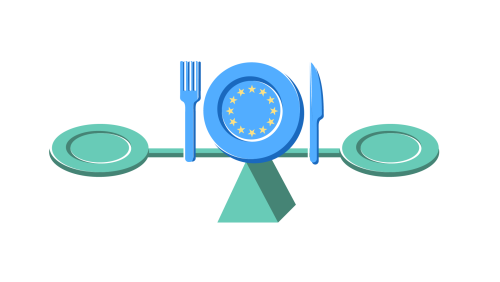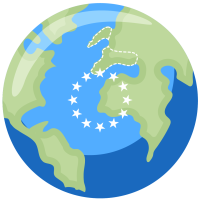The EU has thus begun to pay more attention to the production standards of imported products, as evidenced by the adoption of the carbon border adjustment mechanism, of a regulation against imported deforestation, and another regulation banning the importation of foods containing residues of two neonicotinoids prohibited in the European Union.
Other measures are being discussed in various economic sectors, but progress is slow because it often takes several years for them to be implemented. However, some regulatory divergences need to be addressed urgently to protect our health and the environment.
In the future, the consideration of the production methods of imported goods and services should systematically become the norm in every major European text implementing the Green Deal.
The European Green Deal announced in 2019 and subsequently outlined in several sectoral strategies, including agriculture, includes several overarching objectives:
A 55% reduction in net greenhouse gas emissions by 2030.
A 50% reduction in the use and associated risks of chemical pesticides by 2030.
Revision of animal welfare standards for livestock in the European Union.
Nos campagnes :
Mirror Measure & Mirror Clause:
what are they?

A mirror measure is part of European regulation and aims to extend a production standard imposed on European producers to all producers worldwide who wish to export their goods to the European Union. For example, the prohibition of using growth hormones in livestock feed is a mirror measure.
A mirror clause, on the other hand, is a condition under which the European Union grants privileged access to its market to certain countries through a free trade agreement. This clause allows the granting of "trade preferences," such as a reduction in tariffs, contingent upon compliance with one or more sustainability standards.
Examples of the first mirror clauses

Our themes:
Pesticides
While it is prohibited to treat crops within the EU with substances not approved or banned by European regulations (due to their effects on human and animal health, as well as the environment and biodiversity), crops produced outside the EU may have been treated with these substances, provided that the imported goods into the EU comply with maximum residue limits.
In February 2023, the European Commission adopted a mirror measure on pesticides with the aim of protecting biodiversity and pollinators. The regulation prohibits the importation of products containing traces of two neonicotinoids, thiamethoxam and clothianidin, which are no longer approved in the EU from 2019. In practice, if these molecules are detected in a product, it will not be allowed to enter the European market. This mirror measure is expected to be implemented as early as March 2026.
While this measure is a step in the right direction, the European Commission must now step up its efforts: mirror measures should be implemented for all banned pesticides to protect human health and the environment, with a detailed work program, commitments, and timeline. Priority should be given to the 64 substances banned or not authorized in the EU for which, as of early 2023, maximum residue limits higher than the detection threshold existed for imported product
Meat treated with hormones growth and antibiotics
The use of growth hormones in the livestock sector has been banned in the EU since 1981. And since 1996, this ban has also applied to imports from farms using growth hormones.
Since 2006, the use of antibiotics as growth promoters has been banned in Europe. And new restrictions on the use of veterinary medicines have been in place since 2022. In particular, the use of these medicines in animals to promote their growth or increase their yield is prohibited. This ban is also supposed to apply to animals and animal products imported into the EU. However, this measure will not be implemented until September 2026, could end up being based on a simple system of self-declaration of conformity by producers and does not cover antibiotics used as feed additives.
Animal welfare
European rules regarding animal welfare at the time of slaughter apply to imported products. Thus, in order to be imported into the EU, meats and products from slaughtered animals must be accompanied by a health certificate and a declaration certifying compliance with hygiene and stunning requirements at least equivalent to those of the EU.
Beyond this mirror measure on slaughter, there is still much to be done in terms of animal welfare, including the prohibition of cage farming and certain mutilations inflicted on animals, the banning of the grinding of male chicks, increasing available space, and limiting transport times. It is urgent for the European Commission to adopt ambitious rules on animal welfare including mirror measures. A package of measures was expected to be announced in autumn 2023, but has been postponed to a later date.
Animal meal
The EU has adopted strict regulations on the feeding of ruminants to contribute to the eradication of the so-called "mad cow disease" and its potential transmission to humans, in the form of Creutzfeldt-Jakob disease. A European regulation from 2001 prohibits all proteins and bi/tricalcium phosphates of animal origin in the feed of ruminants.
However, concerning imported products, this prohibition only applies to animal products from bovines originating from so-called "specified risk countries". For other countries (which include several of the EU's trading partners such as Argentina, Brazil, Canada, and the United States), the health certificate required for the importation of beef into the EU does not have to mention the requirement of non-feeding with animal meals. However, the regulations in these countries are much more permissive than EU regulations.
Importation deforestation
The consumption of the EU accounted for more than a third of deforestation linked to global trade between 1990 and 2008. To address this issue, the EU adopted a regulation on imported deforestation in 2023. With this new regulation, certain products (such as timber, palm oil, soy, coffee, cocoa, rubber, and beef, as well as products derived from these raw materials such as hides, leather, charcoal, paper, and printed paper) can only be placed on the market if they meet several conditions. To market products in the EU or export from the EU market, operators must ensure that their production did not result in deforestation or forest degradation after December 31, 2020. They must collect various information, for example, for products containing or made from cattle, the geographical coordinates of all establishments where the cattle were raised.
This regulation is a major step forward but its implementation has already been postponed by one year.. While its robustness remains to be tested in its practical implementation, several limitations have already been identified. Some key products such as maize or biodiesel are not covered. Moreover, the text also does not protect other wooded lands beyond forests, even though nearly 60% of European imports at risk of deforestation concern soy, mainly grown in savannas such as the Cerrado.
